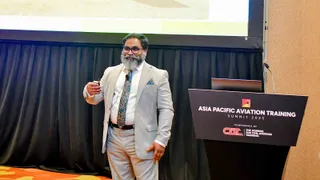Supporting Global Training and Human Resources Development in Aviation
Contact Our Team
For more information about how Halldale can add value to your marketing and promotional campaigns or to discuss event exhibitor and sponsorship opportunities, contact our team to find out more
The Americas -
holly.foster@halldale.com
Rest of World -
jeremy@halldale.com

ICAO Secretary General Raymond Benjamin takes a detailed look at the creation of the ICAO Global Aviation Training Office.
The International Civil Aviation Organization (ICAO) works with its 191 Member States, the industry and other regional and international aviation organizations to develop international Standards and Recommended Practices (SARPs) which are used by States when they develop their legal frameworks addressing civil aviation.
There are currently over 11,000 SARPs contained in the 19 Annexes to the Convention on International Civil Aviation (Chicago Convention) which are overseen by ICAO. It is through these SARPs, as well as ICAO’s global work programmes, auditing responsibilities and capacity-building efforts, that today’s global air transport network is able to operate over 100,000 daily flights safely, efficiently and securely in every region of the world.
All of us in the international air transport community recognize that the benefits of our global network rely strongly on the availability of qualified and competent personnel. This poses further challenges, however, mainly as the audit results of ICAO’s Universal Safety Oversight Audit Programme (USOAP) and Universal Security Audit Programme (USAP) indicate that both States and industry still need to address gaps in this area.
To help address these concerns, ICAO conducted a 2013 assessment to determine how it could better assist States with their skilled-personnel needs. The 38th Session of the ICAO Assembly then further encouraged greater ICAO involvement on related priorities, and together these factors led to the development of a new ICAO Civil Aviation Training Policy and the establishment of our Global Aviation Training (GAT) Office. This office is responsible for the planning, management and coordination of all training and human resources activities at ICAO.
This represents the first time in ICAO’s history that all training activities are now centralized under a single office. The GAT Office will henceforth serve as our Organization’s leading focal point for training and its mission is to bring greater leadership to the coordination of human resources development in aviation, in close collaboration with Member States, international organizations and the industry.
ICAO has always been involved in training activities at various levels, ranging from a supporting facilitator role to being directly involved in the development and conduct of courses. The establishment of the GAT Office will allow the Secretariat to respond more consistently and comprehensively to the needs of our Member States, as well as enhance the standardization of ICAO courses and the quality of the service provided by ICAO. Selection and training of the instructors who deliver ICAO courses will also be standardized.
The implementation of the new ICAO Aviation Training Policy will be based on four main pillars, namely the ICAO TRAINAIR PLUS Programme [i], our recognition of beneficial training offerings and best practices by other aviation stakeholders, specific training offerings developed by ICAO to meet sectoral priorities, and greater cooperation with Member States, United Nations organizations, international and regional organizations, and educational institutions.
ICAO is also now organizing, with the contribution of its Member States and international organizations, global and regional aviation training events to promote greater capacity-building and training in aviation. I would encourage all training organizations and professionals to join our Member States and industry at these gatherings.
I am confident the new ICAO training structure will help contribute to the effective implementation of SARPs and that it will send a strong signal to our sector that ICAO is determined to prioritize training as a key enabler.
About the Author:
Mr. Raymond Benjamin has served as the Secretary General of the International Civil Aviation Organization since August 2009. His extensive career in civil aviation spans more than 30 years, including 13 years as Executive Secretary of the European Civil Aviation Conference (ECAC). Prior to joining ECAC, Benjamin was Chief of the Aviation Security Branch of the Air Transport Bureau to ICAO, served as Air Transport Officer and Deputy Secretary of ECAC from 1982 to 1989, and held various positions in the Civil Aviation Administration of France from 1973 to 1982.
[i] TRAINAIR PLUS was established by ICAO to serve as a cooperative global network of training centres. It is composed of more than 70 organizations across some 65 ICAO Member States. The programme supports its member training centres to develop high-quality competency-based training on topics related to civil aviation.


